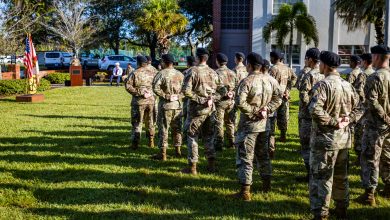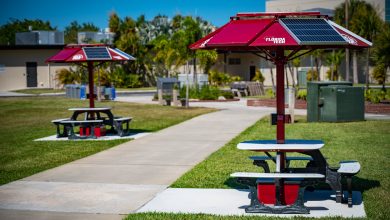Shark Obsession STEMs from Science
Kristin Treat is a senior majoring in marine biology, president of the Marine Biological Society and a member of Tri-Beta Biological Honor Society, Phi-Eta Sigma, Kappa Theta Epsilon, and Alpha Phi sorority. She is AAUS scientific diving certified and her undergraduate research project involves investigating the effects of temperature on the feeding kinematics of the expansive and compressive phases of Lionfish feeding.
Tell us a little bit about yourself?
Most people tell me I’m crazy, but I’m obsessed with one of the ocean’s top apex predators: sharks. They play a crucial role within the marine ecosystem by being at the top of the food chain while maintaining equilibrium and keeping other marine life in balance, yet are frequently misunderstood and vilified. While studying here at Florida Tech, my dreams came true when I had the opportunity to observe Great White shark behavior at Seal Island in South Africa. I’ve always watched Shark Week on TV, but to observe this massive fish up close and personal while cage diving was unbelievable! I spent this past summer as a shark research and conservation intern, working with sharks and rays at the Cape Eleuthera Institute in the Bahamas, conducting research and educating students and visitors who came to the facility. Witnessing the excitement of both kids and adults, while learning about the species and how to protect them reminded me of why I first fell in love with this field.
Aside from my shark obsession, I’m also very passionate about traveling, trying new things, and just about anything water-related (boating, kayaking, paddle boarding, and scuba diving). I love to learn and experience new aspects of life and cultures by venturing to new places, and have been fortunate to be able to travel throughout the Caribbean, Central America, and South Africa. Over Christmas break I swam with the pigs (this really is a “thing”) and nurse sharks in the Exumas, and while on Spring break went cave tubing in Belize and scuba diving with sea turtles in Roatan. Other highlights while traveling were going on safari at the Siyafunda Game Reserve and being mere feet away from massive elephants, hippos and lions, and being equally excited during the sardine run in Port St. John to swim with a humpback whale, dolphins, and sharks. Ultimately, however, sharks and rays are my greatest passion and I hope to have a career conducting research and educating the public about conservation and their importance in our marine environment.
What inspired you to pursue a STEM education and career?
My inspirations were: being part of the shark research team during a 10th grade summer abroad program at the Island School in the Bahamas, being a high school intern at the Cooperative Oxford Lab (working with NOAA and DNR scientists on issues facing the Chesapeake Bay) under the supervision of my mentor, Lee Ann Hutchison (Environmental Education Specialist with the MD State Dept. of Education), and my AP Environmental Science teacher Jane Whitelock. These two women were wonderful role models and were pivotal in influencing my college and career decisions.
What do you think are some of the most shared/common challenges women in STEM fields encounter?
Opportunities (internships, research, leadership roles) are very limited and competitive and often given to men.
How have you overcome obstacles/challenges as a woman in STEM?
I am proactive in all that I do regarding my education and future career. Since my field is extremely competitive I’ve been trying to gain as much hands-on experience (during the summers) as I can while still in college to try to get ahead.
Knowing what you know now, what advice you would give your younger self?
Keep trying no matter how frustrating, never give up, take advantage of every experience and make the most of every single opportunity. Always be persistent and never be intimidated.
What one takeaway would you want to impart on a young woman thinking of pursuing an education/career in STEM?
Work hard in school by taking as many math, science, and advanced classes that you can, try to participate in stem-related activities (camps, clubs, or after school programs), and go for leadership roles. Try to get guidance and advice from female faculty in the STEM fields.
What is an aspect of being a woman in STEM you were surprised to discover?
Being among the minority, I often feel I do stand out merely because of the fact that I am a woman in a male dominated field, and because of this, the people who I come in contact with (personally or via email) generally remember me.
In your experience, what are the top things leaders could do to encourage more young women to enter STEM fields?
Reach out to younger girls by offering more STEM related programs at an earlier age in elementary school. Encourage participation by grabbing young girl’s attention and interest before they mistakenly think that these subjects and fields are too difficult or unattainable. I volunteered in a STEM outreach program for middle school aged girls, and even at that age a lot of the girls did not participate. More encouragement and guidance need to be directed towards young girls in fostering an interest in STEM related fields, and it should continue throughout their educational lives with college grads continuing to receive guidance, opportunities, and scholarships. Our input and contributions as women in STEM related fields are important for our future and should never be overlooked or ignored.
%CODE1MARINEBIOLOGY%





